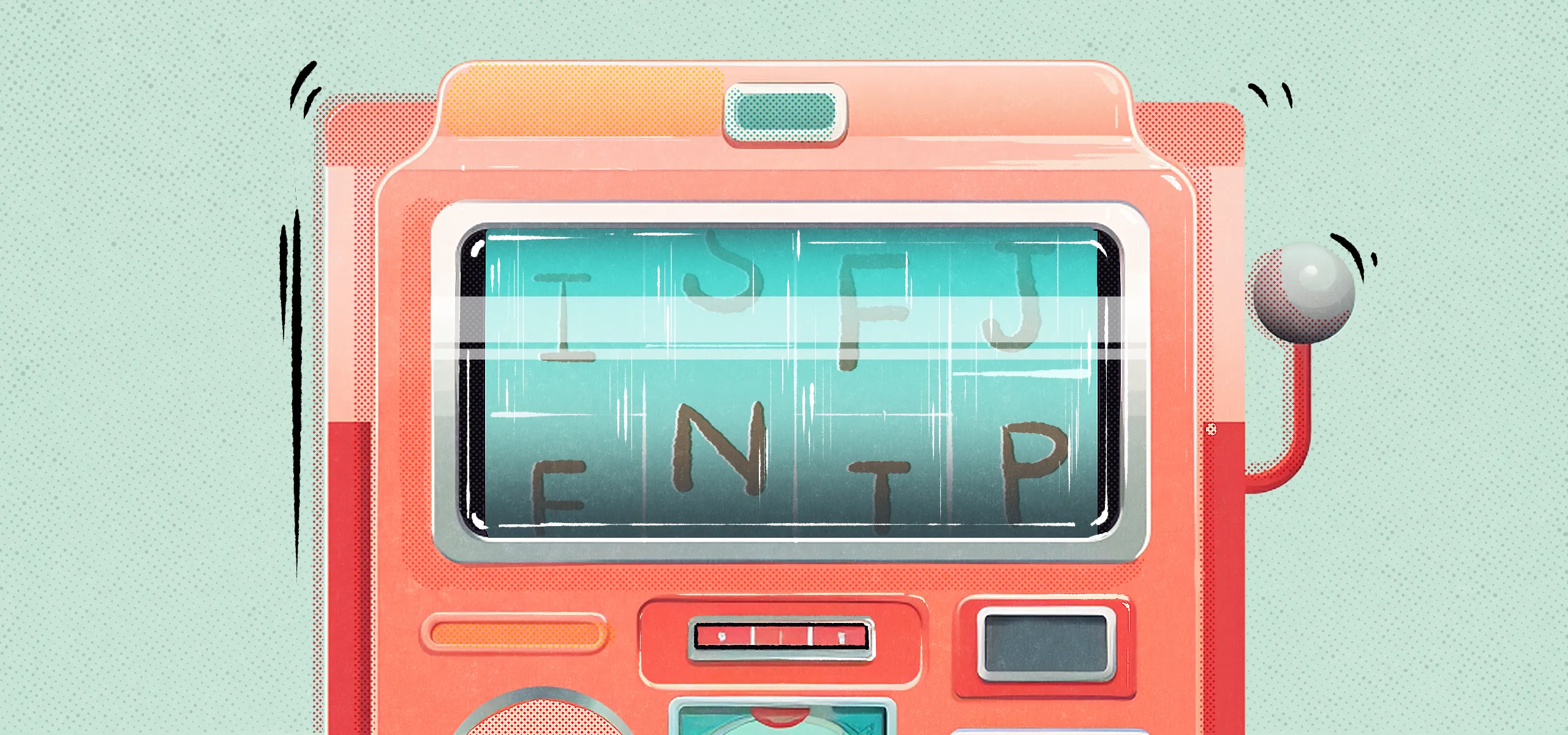From horoscopes to four-letter codes, China’s netizens are trading stars for MBTI personality test charts
Strings of letters have recently been flooding the Chinese internet. The reason? Netizens have embraced the MBTI (Myers–Briggs Type Indicator) personality test, using its distinctive combinations of letters to define and classify themselves and others, sparking the formation of vibrant online communities. Initially designed as a self-assessment tool to delineate personality types and preferences, the MBTI has found immense popularity in China.
As its popularity surges, even those unfamiliar with English are becoming adept at understanding the 16 personality combinations. It has become so embedded in the culture that even the prestigious Beijing Institute of Technology reportedly began allotting student dormitories based on MBTI types, and esoteric products like the “Exclusive Lucky Crystals for the 16 Personality Types (16型人格专属水晶 shíliù xíng réngé zhuānshǔ shuǐjīng)” are flying off the shelves.
Interestingly, a generation previously enchanted by constellations and Tarot cards is now leaning towards this seemingly more “scientific” method of self-analysis. As described by some netizens, “The youth are getting hooked to digital fortune-telling (这届年轻人开始沉迷赛博算命 Zhè jiè niánqīngrén kāishǐ chénmí sàibó suànmìng).”
The MBTI categorizes individuals using four binary traits: introversion (I) or extroversion (E), sensing (S) or intuition (N), thinking (T) or feeling (F), and judging (J) or perceiving (P). This leads to distinct four-letter combinations, like “ISTJ” or “INFP.”
These designations have led to humorous interpretations:
- N (Intuition) is likened to gamblers overflowing with thoughts (思绪很多的赌徒 sīxù hěn duō de dǔtú).
- S (Sensing) individuals are seen as direct and genuine (一根筋老实人 yìgēnjīn lǎoshí rén).
- F (Feeling) types are playfully dubbed as overemotional and excessively forgiving, reminiscent of “virgin mothers” (感性的恋爱脑,同情心泛滥的圣母 gǎnxìng de liàn’ài nǎo, tóngqíngxīn fànlàn de shèngmǔ).
- T (Thinking) individuals adopt a stance of detachment, embodying the “none-of-my-business” attitude (事不关己,高高挂起 shì bù guān jǐ, gāogāo guàqǐ).
- P (Perceiving) types embrace change and spontaneity, often being labeled as carefree, adaptable, and even as masters of procrastination (神经大条,适应环境 shénjīng dàtiáo, shìyìng huánjìng).
- J (Judging) individuals, with their penchant for planning, often command respect and can be seen as control freaks (计划性和控制欲 jìhuàxìng hé kòngzhìyù).
The values “E” and “I” have especially captivated public interest. Those who exhibit extroversion (E) traits are now humorously portrayed as outgoing, talkative, wild, and socially adept (外向健谈发疯社牛 wàixiàng jiàntán fāfēng shèniú). They are often affectionately dubbed ‘social gangsters’ (社交悍匪 shèjiāo hànfěi) due to their robust social skills. Conversely, those with introversion (I) are depicted as reserved, shy, introspective, and socially anxious (内向害羞自闭社恐 nèixiàng hàixiū zìbì shèkǒng).
Netizens often humorously note: “In everyday life, during social events, I oscillate between introversion and extroversion. At work, I initially act extroverted but gradually become more introverted. When I see my crush, I’m extroverted in my head but in reality, I’m all introverted. (生活中的实际情况是:社交时忽I忽E,上班后先E后I,看到 crush 脑内E表面I。Shēnghuó zhōng de shíjì qíngkuàng shì: Shèjiāo shí hū I hū E, shàngbān hòu xiān E hòu I, kàndào crush nǎo nèi E biǎomiàn I.)”
The phrase “Being E (extroverts) for I (introverts) (为I做E wèi I zuò E)” encapsulates how some, despite their introverted nature, step up and act extroverted when a situation demands. In contrast, “becoming I (introverts) due to even more extroverted E (extroverts) (遇 E 则 I yù E zé I)” describes extroverts who seem introverted next to someone even more outgoing.
Haidilao Hotpot restaurants, renowned for their extravagant birthday celebrations, sometimes make customers cringe. Their signature birthday song goes, “Bid farewell to all worries, and embrace all joys (跟所有的烦恼说拜拜,跟所有的快乐 say 嗨嗨 Gēn suǒyǒu de fánnǎo shuō báibái, gēn suǒyǒu de kuàilè say hāi hāi).” It’s a spectacle meant for the ultra-social. So, if an extrovert is invited to such a celebration, they might humorously exclaim, “I can’t take it! I’ve become introverted in the face of even more extroverted individuals. (不行了,我遇E则I了。Bù xíng le, wǒ yù E zé I le.)”
“I’m introverting (I了I了 I le I le),” a play on words reminiscent of “I’m in love (爱了爱了 ài le ài le),” has become a trendy way to describe moments when extroverts suddenly act introverted. The phone terminology also reflects these personality types: a perpetually silent phone is jokingly called an “iPhone,” mirroring its quiet owner. In contrast, a phone that’s always ringing is labeled an “ePhone.”
Relating to battery life, extroverts quip that “socializing is like charging (E人:出门就是充电 E rén: Chūmén jiùshì chōngdiàn),” while introverts jest, “I charge for two hours at home, but drain in just ten minutes outside (I人:在家充电两小时,出门耗电十分钟 I rén: Zàijiā chōngdiàn liǎng xiǎoshí, chūmén hàodiàn shí fēnzhōng).”
Beyond the dichotomy of “E” and “I,” other MBTI traits have sparked widespread discussions and interpretations.
Netizens aptly note, “An ‘F’ individual, when comforting a friend, asks ‘How are you feeling?’ Meanwhile, a ‘T’ individual inquires, ‘What are you planning to do next?’ (F人安慰朋友是问你怎么样?T人安慰朋友是问你怎么办?F rén ānwèi péngyou shì wèn nǐ zěnme yàng? T rén ānwèi péngyou shì wèn nǐ zěnme bàn?)”
They also jest on social media, “Want to irk a P type? Ask them to draft a meticulous plan. And to unsettle a J type? Simply suggest: ‘We’ll decide on the fly.’ (如何伤害P人,让他们先写个计划书吧。如何伤害J人,告诉他们到时候再说吧。Rúhé shānghài P rén, ràng tāmen xiān xiě gè jìhuàshū ba. Rúhé shānghài J rén, gàosù tāmen dàoshíhòu zàishuō ba.)”
Amidst the playful sarcasm, these eight seemingly simple letters have facilitated deeper self-awareness and even fostered a sense of camaraderie on social media platforms. Individuals uncover their strengths and humorously acknowledge their quirks.
This newfound self-awareness not only aids in understanding their inherent values but also offers an outlet for the pervasive unease that plagues today’s youth. Many find solace in thinking, “My chronic anxiety, over-sensitivity, and self-doubt stem from being an INFP. Such traits are typical for this personality type; thus, I’m perfectly normal. (我持续性焦虑、敏感多疑、内耗严重,是因为我是INFP。这种人格的特征就是这样,所以我很正常。Wǒ chíxùxìng jiāolǜ、mǐngǎn duōyí、nèihào yánzhòng, shì yīnwèi wǒ shì INFP. Zhè zhǒng réngé de tèzhēng jiùshì zhèyàng, suǒyǐ wǒ hěn zhèngcháng.)”
In the ever-evolving dance of personality, it’s crucial to recognize its fluidity. While the allure of MBTI captures the moment, it’s worth noting that, much like the saying, “Pretending to be extroverted until truly becoming so (假E真做 jiǎ E zhēn zuò),” people’s personalities can and often do adapt over time, shaped by life’s ever-changing demands and experiences.












